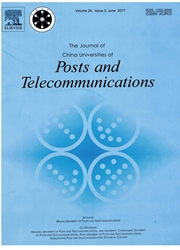

 中文摘要:
中文摘要:
单个价值分解(SVD ) 的表演基于多重输入多重产量(MIMO ) 在传输器和接收装置与适应调整(AM ) 依赖于隧道状态信息(CSI ) 的精确性。为一条变化时间的隧道,然而,在传输器或接收装置获得的 CSI 由于固有的延期或错误是不正确的。当过时的 CSI 被用来播送数据时,采用 SVD 的一个典型系统在能力承受降级。这篇文章首先探讨在完美的 CSI 假设下面设计的适应调整 MIMO 系统。基于那,过时的 CSI 的二种情形被调查并且分析。系统性能上的有瑕疵的 CSI 的效果集中于并且处理 SNR (pSNR ) 的一张简单帖子调整设计为在一般水准减少降级在二种情形在 AM 系统上被建议光谱效率(ASE ) 。模拟结果证明这些图案以一个适应方法提供好性能,并且更加更使适应 MIMO 系统能对 CSI 瑕疵柔韧。
 英文摘要:
英文摘要:
The performance of singular value decomposition (SVD)-based multiple-input multiple-output (MIMO) with adaptive modulation (AM) is dependent on the accuracy of the channel state information (CSI) at the transmitter and the receiver. However, for a time-varying channel, the CSI obtained at the transmitter or the receiver is incorrect owing to an inherent delay or error. A typical system employing SVD suffers degradation in capacity when outdated CSI is used to transmit data. This article first addresses the adaptive modulation MIMO system designed under perfect CSI assumption. Based on that, two scenarios of outdated CSI are investigated and analyzed. The effect of imperfect CSI on the system performance is focused on and a simple post processing SNR (pSNR) adjustment design is proposed on AM system in the two scenarios for reducing degradation in average spectral efficiency (ASE). Simulation results show that these designs provide good performance in an adaptive way, and enable the adaptive MIMO system considerably more to be robust against CSI imperfection.
 同期刊论文项目
同期刊论文项目
 同项目期刊论文
同项目期刊论文
 Distributed precoder with a novel version of particle swarm optimisation algorithm in QR decompositi
Distributed precoder with a novel version of particle swarm optimisation algorithm in QR decompositi Proportional fair-based joint subcarrier and power allocation in relay-enhanced orthogonal frequency
Proportional fair-based joint subcarrier and power allocation in relay-enhanced orthogonal frequency 期刊信息
期刊信息
